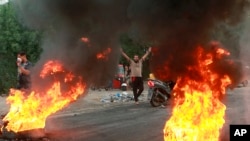The death toll in Iraq from six days of clashes between anti-government protesters and security forces rose to 104 people on Sunday, as demonstrations continued into another day.
A spokesman for Iraq's Interior Ministry said 6,107 people have been wounded since the protests began on Tuesday, including more than 1,200 security members. He said eight of the 104 people who have died in the clashes were security personnel.
Protests continued on Sunday with several hundred anti-government protesters gathering in a suburb of the Iraqi capital, Baghdad. Witnesses say soldiers fired in the direction of the protesters and blocked a main road near Sadr City to prevent the demonstrators from advancing.
Protests on Saturday night left at least 19 people dead.
The protests in Baghdad and in several southern Iraqi cities have grown from initial demands for jobs and improved city services, such as water and power, to calls now to end corruption in the oil-rich country of nearly 40 million people.
Iraq's Cabinet issued a new reform plan early Sunday in an effort to respond to the protests that have taken authorities by surprise.
After meeting through the night Saturday, cabinet officials released a series of planned reforms, which addressed land distributions and military enlistments as well as increasing welfare stipends for poor families and training programs for unemployed youth.
Iraq's Prime Minister Adel Abdul-Mahdi told his Cabinet late Saturday in televised remarks that he is willing to meet with protesters and hear their demands. He called on the protesters to end their demonstrations.
The Iraqi parliament tried to respond to the crisis on Saturday by calling an emergency session, however they were unable to reach a quorum because of legislators who are boycotting parliamentary sessions.
Former Shi'ite militia leader Moqtada al-Sadr, who leads the largest opposition bloc in parliament, called Friday for the government to resign and said "early elections should be held under U.N. supervision."
The protests are the first major challenge to Prime Minister Abdul-Mahdi, who formed his government a year ago.
The government has blamed the violence on "groups of riot inciters" and has said security forces are working to protect the safety of peaceful protesters.
Iraq's parliament has ordered a probe into the violence.
Many Iraqi citizens blame politicians and government officials for the corruption that has prevented the country from rebounding from years of sectarian violence and the battle to defeat Islamic State militants, who at one point controlled large areas in the northern and western part of the country.










